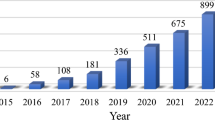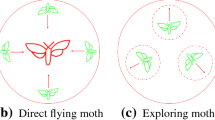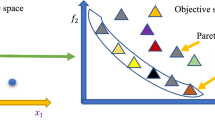Abstract
Moth-flame optimizer (MFO) is one of the recently proposed metaheuristic optimization techniques which has been successfully used in wide range of applications. However, there are two issues with the MFO algorithm. First, as a stochastic technique, MFO may prematurely converge at some local minima during the search process. Second, the original MFO was developed for continuous search space problems and is not directly applicable to, e.g., permutation-based problems (PBP). In this paper, a novel perturbation strategy is introduced to the MFO algorithm to avoid probable local minima regions. This strategy works as follows: if the best solution obtained so far doesn’t improve for a given number of consecutive iterations, the current population of solutions is perturbed using some crossover mechanism as an attempt to explore new promising neighbourhoods in the search space. In addition, smallest position values mapping technique is employed in order for the proposed, termed CrossMFO (COMFO), algorithm to be applicable to PBP problems. It is noticed that, despite these modifications, the proposed COMFO has the same time complexity order as the original MFO. Extensive simulation experiments are conducted to compare the proposed COMFO to the MFO, other enhanced versions of MFO, and some metaheuristic optimizers in solving the well-known Travelling Salesman Problem (TSP). Empirical results show that the solutions obtained using MFO are improved by a factor of 24–47% on average for large TSP instances having more than 100 cities using COMFO and can even reach 38–58% using different settings. In addition, compared to other algorithms in the literature, the proposed algorithm provides, on average, better solutions. Hence, it can be considered a promising and efficient technique for this type of problems.













Similar content being viewed by others
References
Talbi E (2009) Metaheuristics: from design to implementation. Wiley Publishing, Hoboken
Pórez Cáceres L, López-Ibáñez M, Stützle T (2014) Ant colony optimization on a budget of 1000. In: Dorigo M et al. (Eds.), Swarm Intell ANTS 2014. Lecture Notes in Computer Science, vol 8667:50–61. Springer
Kirkpatrick S, Gelatt CD, Vecchi MP (1983) Optimization by simulated annealing. Science 220:671–680
Marti R, Pardalos PM, Resende MGC (2018) Handbook of heuristics. Springer, Berlin
Martins SL, Ribeiro C (2006) Metaheuristics and applications to optimization problems in telecommunications. In: Resende M, Pardalos P (eds) Handbook of optimization in telecommunications. Springer, Berlin, pp 103–128
Hussain K, Salleh M, Cheng S, Shi Y (2018) Metaheuristic research: a comprehensive survey. Artif Intell Rev 54:2191–2233
Soler-Dominguez A, Juan AA, Kizys R (2017) A survey on financial applications of metaheuristics. ACM Comput Surv 50(1):1–23
Beheshti Z, Shamsuddin SM (2013) A review of population-based meta-heuristic algorithm. Int J Adv Soft Comput Appl 5:1–35
Mitchell M (1998) An introduction to genetic algorithms. MIT Press, Cambridge
Banks A, Vincent J, Anyakoha C (2008) A review of particle swarm optimization. Part ii: hybridisation, combinatorial, multicriteria and constrained optimization, and indicative applications. Nat Comput 7:109–124
Lampinen J, Storn R (2004) Differential evolution. In: New optimization techniques in engineering. Studies in Fuzziness and Soft Computing, vol 141. Springer, Berlin
Yang X-S, Deb S (2009). Cuckoo search via Lévy flights. World congress on nature & biologically inspired computing (NaBIC 2009). IEEE Publications, pp 210–214. arXiv:1003.1594v1
Karaboga D, Gorkemli B, Ozturk C, Karaboga N (2014) A comprehensive survey: artificial bee colony (ABC) algorithm and applications. Artif Intell Rev 42:21–57
Chopard B, Tomassini M (2018) An introduction to metaheuristics for optimization. Springer, Berlin
Mehdi M (2011) Parallel hybrid optimization methods for permutation-based problems. Ph.D. thesis, University of Science and Technology of Lille I
Punnen AP (2007) The traveling salesman problem: applications, formulations and variations. In: Gutin G, Punnen AP (eds) The traveling salesman problem, and its variations. Springer, Berlin, pp 1–28
Gonçalves JF, Resende MG (2011) Biased random-key genetic algorithms for combinatorial optimization. J Heuristics 17:487–525
Deng Y, Liu Y, Zhou Y (2015) An improved genetic algorithm with initial population strategy for symmetric TSP. Math Prob Eng 2015:1024–123X
Hoffmann M, Mühlenthaler M, Helwig S, Wanka R, (2011) Discrete particle swarm optimization for TSP: theoretical results and experimental evaluations. In: Bouchachia A eds) Adaptive and intelligent systems. ICAIS, Lecture Notes in Computer Science, vol 6943. Springer, Berlin
Mi M, Huifeng X, Ming Z, Yu G (2010) An improved differential evolution algorithm for TSP problem. In: International conference on intelligent computation technology and automation, Changsha, pp 544–547
Ouaarab A, Ahiod B, Yang X-S (2015) Random-key cuckoo search for the travelling salesman problem. Soft Comput 19(4):1432–7643
Li L, Cheng Y, Tan L, Niu B, (2012) A discrete artificial bee colony algorithm for TSP problem. In: Huang DS, Gan Y, Premaratne P, Han K (eds) Bio-inspired computing and applications. ICIC, Lecture Notes in Computer Science, vol 6840. Springer, Berlin
Dorigo M, Blum C (2005) Ant colony optimization theory: a survey. Theor Comput Sci 344:243–278
Li M (2015) Efficiency improvement of ant colony optimization in solving the moderate LTSP. J. Syst Eng Electron 26:1300–1308
Eskandari L, Jafarian A, Rahimloo P, Baleanu D (2019) A modified and enhanced ant colony optimization algorithm for traveling salesman problem. In: Taş K, Baleanu D, Machado J (eds) Mathematical methods in engineering. Nonlinear Systems and Complexity, vol 23. Springer, Berlin
Mavrovouniotis M, Martins Müller F, Yang S (2017) Ant colony optimization with local search for dynamic traveling salesman problems. IEEE Trans Cybern 47(7):1743–1756
Dorigo M, Gambardella LM (1997) Ant colonies for the travelling salesman problem. Biosystems 43(2):73–81
Jun-man K, Yi Z (2012) Application of an improved ant colony optimization on generalized traveling salesman problem. Energy Proc 17:319–325
Mirjalili S (2015) Moth-flame optimization algorithm: a novel nature-inspired heuristic paradigm. Knowl Based Syst 89:228–249
Barham R, Sharieh A, Sleit A (2019) Multi-Moth flame optimization for solving the link prediction problem in complex networks. Evol Intell 12:563–591
Allam D, Yousri DA, Eteiba MB (2016) Parameters extraction of the three diode model for the multi-crystalline solar cell/module using Moth-flame optimization algorithm. Energy Convers Manag 123:535–548
Taher MA, Kamel S, Jurado F, Ebeed M (2018) An improved moth-flame optimization algorithm for solving optimal power flow problem. Int Trans Electr Energy Syst 29(3):e2743
Lei X, Fang M, Fujita H (2019) Moth-flame optimization-based algorithm with synthetic dynamic PPI networks for discovering protein complexes. Knowl Based Syst 172:76–85
AbdElhamid H, Helmi A, Ziedan I (2019) LCMFO: an improved moth-flame algorithm for combinatorial optimization problems. Int J Eng Techol 10:1793–1800
Xu L, Li Y, Li K, Beng G, Jiang Z, Wang C, Liu N (2018) Enhanced moth-flame optimization based on cultural learning and Gaussian mutation. J Bionic Eng 15(4):751–763
Wang M, Chen H, Yang B, Zhao X, Hu L, Cai Z, Huang H, Tong C (2017) Toward an optimal kernel extreme learning machine using a chaotic moth-flame optimization strategy with applications in medical diagnoses. Neurocomputing 267:69–84
Xu Y, Chen H, Heidari AA, Luo J, Zhang Q, Zhao X, Li C (2019) An efficient chaotic mutative moth-flame-inspired optimizer for global optimization tasks. Expert Syst Appl 129:135–155
Li Z, Zhou Y, Zhang S, Song J (2016) Lévy-flight Moth-flame algorithm for function optimization and engineering design problems. Math Probl Eng 2016:1–22
Sapre S, Mini S (2019) Opposition-based moth flame optimization with Cauchy mutation and evolutionary boundary constraint handling for global optimization. Soft Comput 23:6023–6041
Xu Y, Chen H, Luo J, Zhang Q, Jiao S, Zhang X (2019) Enhanced moth-flame optimizer with mutation strategy for global optimization. Inf Sci 492:181–203
Savsani V, Tawhid MA (2017) Non-dominated sorting moth flame optimization (NS-MFO) for multi-objective problems. Eng Appl Artif Intell 63:20–32
Khalilpourazari S, Khalilpourazary S (2017) An efficient hybrid algorithm based on water cycle and moth-flame optimization algorithms for solving numerical and constrained engineering optimization problems. Soft Comput 23(5):1699–1722
Li C, Niu Z, Song Z, Li B, Fan J, Liu PX (2018) A double evolutionary learning moth-flame optimization for real-parameter global optimization problems. IEEE Access 6:76700–76727
Shehab M, Abualigah L, Al Hamad H (2019) Moth-flame optimization algorithm: variants and applications. Neural Comput Appl 10:65
Snyder LV, Daskin MS (2006) A random-key genetic algorithm for the generalized travelling salesman problem. Eur J Oper Res 174:38–53
Reinelt G, TSPLIB Datasets. http://elib.zib.de/pub/mp-testdata/tsp/tsplib/tsplib.html. Accessed 04 Apr 2019
Chechkin AV, Metzler R, Klafter J, Gonchar V (2008) Introduction to the theory of Lévy flights. In: Klage H, Radons G, Sokolov IM (eds) Anomalous transport, chapter 5. Wiley, Hoboken, pp 129–162
Tomasello M, Kruger AC, Ratner HH (1993) Cultural learning. Behav Brain Sci 16(3):495–511
Candelieri A, Conforti D (2010) A hyper-solution framework for SVM classification: application for predicting destabilizations in chronic heart failure patients. Open Med Inf J 4:136–140
García S, Molina D, Lozano D, Herrera F (2008) A study on the use of nonparametric tests for analyzing the evolutionary algorithms’ behaviour: a case study on the CEC’2005 special session on real parameter optimization. J Heuristics 15:617–644
Trawinski B, Smetek M, Telec Z, Lasota T (2012) Nonparametric statistical analysis for multiple comparison of machine learning regression algorithms. Int J Appl Math Comput Sci 22(4):867–881
Acknowledgements
Authors would like to thank anonymous reviewers who gave very important comments and interesting suggestions which substantially improve the quality of this work.
Author information
Authors and Affiliations
Corresponding author
Ethics declarations
Conflict of interest
All authors declare that they have no conflicts of interest.
Human and animal rights
This article does not contain any studies with human participants or animals performed by any of the authors.
Additional information
Publisher's Note
Springer Nature remains neutral with regard to jurisdictional claims in published maps and institutional affiliations.
Rights and permissions
About this article
Cite this article
Helmi, A., Alenany, A. An enhanced Moth-flame optimization algorithm for permutation-based problems. Evol. Intel. 13, 741–764 (2020). https://doi.org/10.1007/s12065-020-00389-6
Received:
Revised:
Accepted:
Published:
Issue Date:
DOI: https://doi.org/10.1007/s12065-020-00389-6




